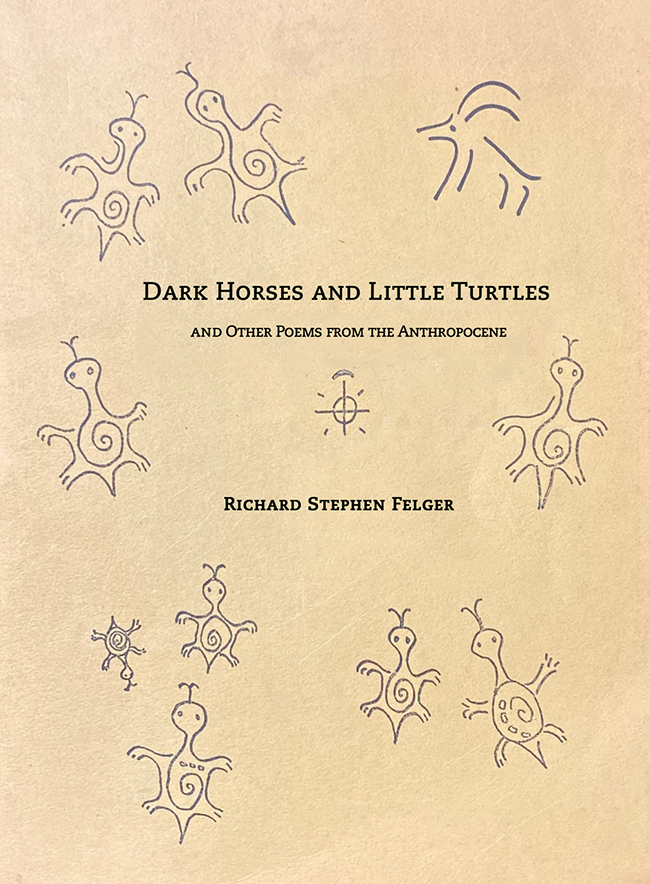Banda De Los Muertos
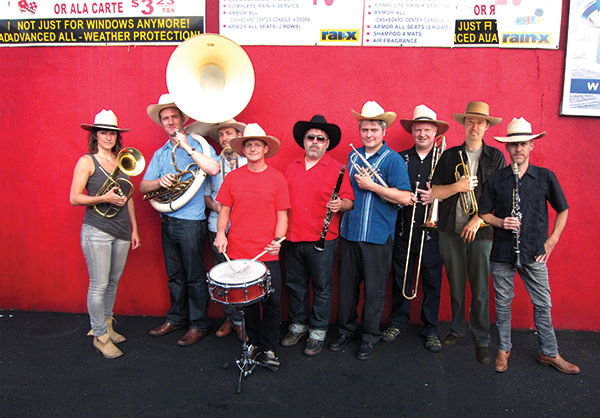
Banda De Los Muertos
“Jacob and I want to dedicate this album to all of the immigrants, like my parents, who came to the United States from Mexico to start a new life, but who held on to their memories and to the music that they loved.” – Oscar Noriega
Oscar Noriega may live in New York, but he’s old school Tucson at heart. Born in California of Mexican immigrant parents, before moving to Tucson when he was eight, the forty-seven year-old Brooklyn resident and Sunnyside High graduate spent a good part of the 1970s playing in Hermanos JOVEL with his four brothers, playing rancheras, boleros, cumbias and other traditional Mexican music all over the Tucson area. Eventually leaving Tucson for California then the east coast, he studied jazz at Berklee in Boston before landing in New York City, where he’s called home for the last 25 years. Noriega has made a living as a jazz musician in NY for most of that time, no mean feat, playing alto sax, clarinet and drums with the likes of Lee Konitz, Paul Motian, Dewy Redman and Tim Berne.
Well, you can take the musician out of Tucson, but you can’t take Tucson out of the musician. Somewhere along the way Noriega rekindled his interest in traditional Mexican music, especially the brass driven genre banda, which has also been popular in the barrios of Los Angeles and Southern California in recent years. Along with fellow jazz/world music traveller Jacob Garchik (they played together in the Balkan hybrid combo Slavic Soul Party) they founded Banda De Los Muertos five years ago to play at a Dia de los Muertos celebration in Brooklyn. They have been playing ever since to crowds equal parts New York hipsters and Mexican and other Latino immigrants. They have just released their debut CD on New York’s Barbés Records, home to many fine internationally-flavored releases, and, incidentally, the new label for Tucson’s own XIXA, formerly known as Chicha Dust. The CD has gained considerable traction in the national media, including a review on NPR’s “Fresh Air.” One of their recent live shows was warmly reviewed in the New York Times. They are putting a national spotlight on banda in much the same way that the game-changing Barbés release Roots of Chicha did for the Peruvian psychedelic cumbia hybrid chicha several years earlier.
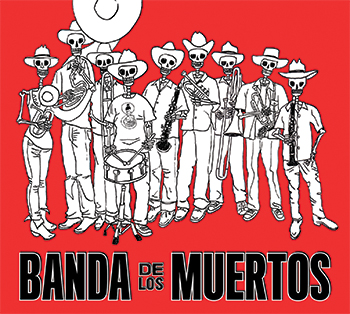
Banda album cover illustrated by Valerie Trucchia.
Banda De Los Muertos’ self-titled CD sticks fairly close to traditional banda, with barely a hint of modernity around the edges. The rest of the band is rounded out with several other NY-based jazz players, and topped off with the occasional vocals of Mireya Ramos, of New York’s popular all female mariachi ensemble Mariachi Flor de Toloache. The album mixes up traditional banda and other Mexican tunes (including “Tragos Amargos,” a hit for Ramon Ayala) with a cover of Marty Robbins’ hit “El Paso” and a lovely cover of “Te Quiero Tanto,” a song written and originally sung by Noriega’s grandmother Susana Dominguez Ruiz. Perhaps best of all is the rousing the lead-off track, “Cumbia de Jacobo,” a slippery, party-ready shuffle written by Noriega and Garchik. And their first video, for “El Paso,” features classic footage of the brothers and la familia in Tucson in the 70s.
Noriega’s life in Tucson was saturated with music, both with Hermanos JOVEL and in the culture at large. “From the 7th grade till my senior year of high school I was gigging almost every weekend. We played a lot of Mexican parties and weddings, quinceañeras, we played at the El Casino Ballroom a bunch. We did a lot of church functions, and you know Arizona, everybody had parties in their backyard. We also did gigs in Bisbee, Wilcox, Green Valley, wherever they called us from.”
“My father always had Mexican music going, constantly, a lot of banda music, a lot of norteña. He had the house fully wired, there was speakers everywhere, outside, inside, every room had it. And we went to church every week (at Santa Monica), and there was always a mariachi band playing there every week. There was always some kind of music going on.”
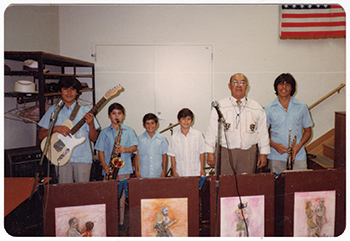
Hermanos JOVEL (Victor with guitar, Oscar with saxophone, Indio, Elias, our teacher Uchi Hernandez and Jaime with trumpet) playing a gig at the senior citizen center down town Tucson in the early 80’.
What did playing music at such a young age bring to his career as a musician, especially one in the high stakes game of jazz, with its improvisation? “I think it was good just have experience at a young age. Nothing beats performance, in front of people…it gave me confidence, to improvise. In the end I realized that it’s all the same, you just use your ears and play, and try and expand on the song your performing.”
“We played in front of the Trump building a month ago, after the debate. Where I grew up, it was 45 kilometers from the Mexican border, and a lot of Mexican’s would pass on our street asking for water or food, and we would feed them. As a kid…it took me awhile to realize what was happening. When I left Tucson and moved to the east coast, I didn’t really think about it for awhile, until I came back as an adult and realized what it was. And then playing this music brought me back to remembering what was going on at that time and seeing a lot of what was happening to immigrants that were coming to Tucson, seeing how they were treated. What I loved when I was a kid, and playing for all kinds of people…it was always a festive moment, some kind of happiness was going on there, amongst all the chaos going on.”
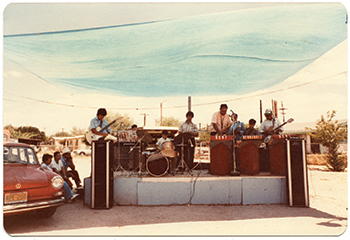
A party in the south side of Tucson
With offers coming in to play around the country, it seems inevitable that Banda De Los Muertos will eventually make it to Tucson, which would be only fitting. Noriega says “Ironically, when I was high school, I was like ‘I’m never playing this music again, I just want to play jazz or classical music.’ I’ve come full circle to this music again.”
Category: MUSIC

